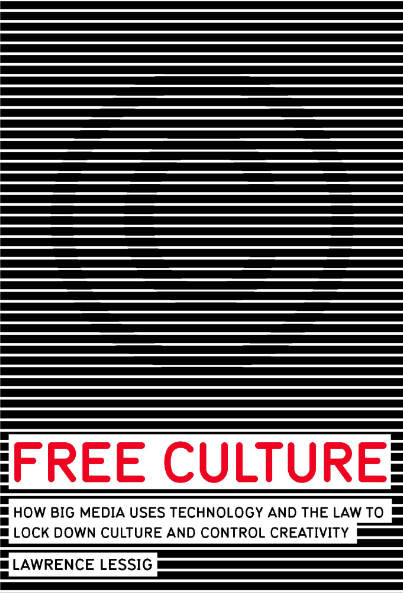صدر حديثًا
هذا الكتاب جديد وسيتم رفعه فور توفره لدينا وبعد الحصول على حقوق النشر اللازمة.

كتاب Free Culture: How Big Media Uses Technology and the Law to Lock Down Culture and Control Creativity PDF
(0)
المؤلف:
لورانس ليسيجعدد القراءات:
132
اللغة:
الإنجليزية
الفئة:
علوم اجتماعيةالقسم:
الصفحات:
353
الجودة:
ممتاز
المشاهدات:
1235
اقتباس
مراجعة
حفظ
مشاركة
جديد
وصف الكتاب
A landmark manifesto about the genuine closing of the American mind. Lawrence Lessig could be called a cultural environmentalist. One of America's most original and influential public intellectuals, his focus is the social dimension of creativity: how creative work builds on the past and how society encourages or inhibits that building with laws and technologies. In his two previous books, Code and The Future of Ideas, Lessig concentrated on the destruction of much of the original promise of the Internet. Now, in Free Culture, he widens his focus to consider the diminishment of the larger public domain of ideas. In this powerful wake-up call he shows how short-sighted interests blind to the long-term damage they're inflicting are poisoning the ecosystem that fosters innovation. All creative works-books, movies, records, software, and so on-are a compromise between what can be imagined and what is possible-technologically and legally. For more than two hundred years, laws in America have sought a balance between rewarding creativity and allowing the borrowing from which new creativity springs. The original term of copyright set by the Constitution in 1787 was seventeen years. Now it is closer to two hundred. Thomas Jefferson considered protecting the public against overly long monopolies on creative works an essential government role. What did he know that we've forgotten? Lawrence Lessig shows us that while new technologies always lead to new laws, never before have the big cultural monopolists used the fear created by new technologies, specifically the Internet, to shrink the public domain of ideas, even as the same corporations use the same technologies to control more and more what we can and can't do with culture. As more and more culture becomes digitized, more and more becomes controllable, even as laws are being toughened at the behest of the big media groups. What's at stake is our freedom-freedom to create, freedom to build, and ultimately, freedom to imagine.
لورانس ليسيج
لورانس ليسيج أستاذ القانون والقيادة في روي إل فورمان بكلية الحقوق بجامعة هارفارد. قبل عودته إلى هارفارد ، درس في كلية الحقوق بجامعة ستانفورد ، حيث أسس مركز الإنترنت والمجتمع ، وفي جامعة شيكاغو. كان كاتبًا للقاضي ريتشارد بوسنر في الدائرة السابعة لمحكمة الاستئناف والقاضي أنتونين سكاليا في المحكمة العليا للولايات المتحدة.
ليسيج هو مؤسس مواطنون متساوون وعضو مجلس إدارة مؤسس في المشاع الإبداعي ، ويعمل في المجلس العلمي لصندوق أبحاث AXA. وهو عضو في الأكاديمية الأمريكية للفنون والعلوم والجمعية الفلسفية الأمريكية ، وقد حصل على العديد من الجوائز بما في ذلك جائزة ويبي ، وجائزة الحرية لمؤسسة البرمجيات الحرة ، وجائزة Scientific American 50 ، وجائزة Fastcase 50.
بمجرد أن استشهدت مجلة نيويوركر بأنها "أهم مفكر في الملكية الفكرية في عصر الإنترنت" ، حول ليسيج تركيزه من القانون والتكنولوجيا إلى "الفساد المؤسسي" - العلاقات التي ، في حين أنها قانونية ، تضعف ثقة الجمهور في المؤسسة - خاصة لأن ذلك يؤثر على الديمقراطية.
ليسيج حاصل على بكالوريوس في الاقتصاد وبكالوريوس في الإدارة من جامعة بنسلفانيا وماجستير في الفلسفة من جامعة كامبريدج ودكتوراه في القانون من جامعة ييل.
اقرأ المزيد
الكتاب غير متاح حاليًا
هذا الكتاب غير متاح حاليًا للنشر. لقد حصلنا عليه من بموجب ترخيص المشاع الإبداعي، ولكن المؤلف أو دار النشر لم يمنحا الإذن بنشره.
قيم الآن
5 نجوم
4 نجوم
3 نجوم
2 نجوم
1 نجوم
اقتباسات Free Culture: How Big Media Uses Technology and the Law to Lock Down Culture and Control Creativity
الأعلى تقييماً
الأحدث
اقتباس
كن أول من يترك اقتباسًا واكسب 10 نقاط
بدلاً من 3
التعليقات
كن أول من يترك تعليقًا واكسب 5 نقاط
بدلاً من 3